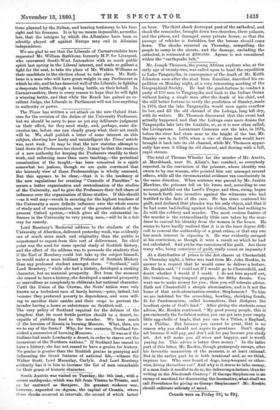Lord Rosebery's Rectorial address to the students of the University
of Aberdeen, delivered yesterday week, was evidently one of much more mark and originality than the public is accnstomed to expect from this sort of deliverance. Its chief point was the need for more special study of Scottish history, and the effect of the address was to persuade the students that if the Earl of Rosebery could but take up the subject himself, he would make a more.brilliant Professor of Scottish History than any professed student amongst them. " Scotland," said Lord Rosebery, " while she had a history, developed a striking character, but no material . prosperity. But from the moment she ceased to have a history, she developed a material prosperity so marvellous as completely to obliterate her national character. Until the Union of the Crowns, the Scots' nation were only known as a turbulent race, of hardy heroes,—poor, indeed, but because they preferred poverty to dependence, and were will- ing to sacrifice their castles and their crops to prevent the invader having a home or subsistence on Scottish soil The very policy of Scotland required for the defence of the kingdom that its most fertile portion should be a _desert, in- capable of yielding food to the invader. We hear much of the heroism of Russia in burning Moscow. What, then, are we to say of the Soots P Why, for two centuries, Scotland fur-
nished a succession of burning Moscows It was as if the Italians had made.Lombardy a desert, in order to starve out the incursions of the Northern nations." If Scotland has ceased to have a history, she has not ceased to have a genius for history. No genius is greater than the Scottish genius in grasping and delineating the broad features of national life,—witness Sir Walter Scott, Lord Macaulay, Carlyle. And Lord Rosebery evidently has it in him to increase the list of men remarkable for their grasp of historic character.


































 Previous page
Previous page